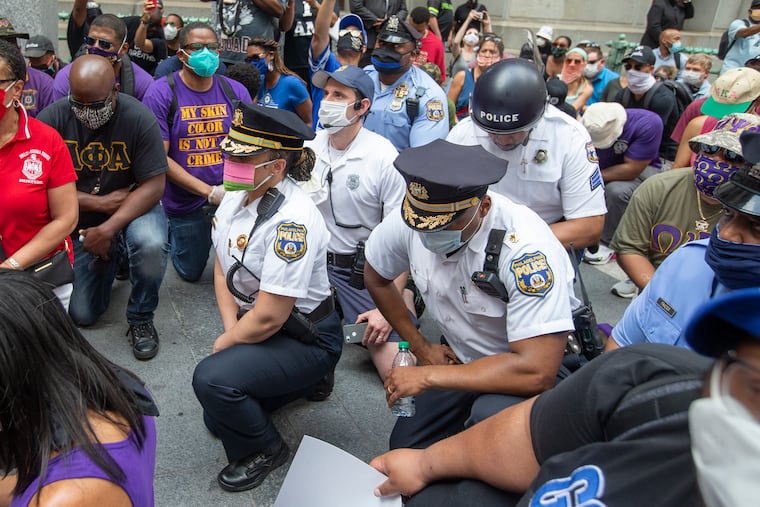Now it’s time for people with power to take a stand, not a knee, against police brutality | Helen Ubiñas
Do your jobs, which to recap, is to protect the communities you are sworn to serve.

Get up!
I’m talking to you, Mayor Jim Kenney.
And to you, Police Commissioner Danielle Outlaw.
And to every cop and politician suddenly taking a knee in performative solidarity.
Kudos to congressional Democrats for introducing sweeping legislation to reform police. But stop wasting time with the kente cloth prop and the kneeling.
Get up!
The moment to take a knee — especially for people in positions of power — would have been when former NFL quarterback Colin Kaepernick was blackballed for trying to bring attention to police brutality and racial injustice in 2016. Or, you know, any time before and since, because he was hardly the first to protest this country’s inequities.
Don’t take a knee. Do your jobs, which, to recap, are to protect the communities you are sworn to serve.
And that requires making it crystal clear that you don’t support dirty cops or military tactics against civilians — and you discourage spectacles like the one that unfolded at Fraternal Order of Police headquarters on Monday, when a large crowd of officers, some in uniform, gathered to applaud Inspector Joseph Bologna, who’d been charged with assaulting a protester a week earlier.
An assault that was recorded. That episode, and the video of the teargassing of protesters trapped on I-676, should finally end the belief that police narratives are always true.
And yet, even while assuring that the incident would be investigated, Kenney and Outlaw issued statements that boiled down to “believe cops” — which is exactly the knee-jerk blind faith that got us here.
They claimed the use of gas was a “last resort” taken after protesters flooded an open highway, surrounded a state trooper’s car, and threw rocks at officers.
That’s according to “firsthand accounts of high-ranking police commanders who witnessed the incident.”
Hark, who goes there? Why, it’s the we-support-our-police crowd, right on cue with cries that cops are under attack. Remember, most cops who get fired get rehired, and usually after being shamelessly defended by the FOP president with a dog whistle that rivals President Donald Trump’s. In 2017, John McNesby called Black Lives Matter protesters “a pack of rabid animals” for demonstrating outside the home of a cop who fatally shot a black man.
And for all you "good cops” bemoaning that the backlash makes you want to get out of policing because you’re tired of feeling like unappreciated targets, a hearty boo-freaking-hoo to you. Because if that’s the lesson you’re taking from these nationwide calls for police reform, you should no more be a law enforcement officer than your brothers in blue choking someone to death or beating protesters on the street.
Enough with the whole “a few bad apples” defense of “good cops." Actually, a few bad apples spoil the barrel.
And now that I think about it, a rancid, rotting barrel of apples is the image I should have used in a 2014 column declaring the Roundhouse a crime scene after six narcotics officers were arrested in a federal corruption probe. All were acquitted and won their jobs back through — surprise! — arbitration, the Kryptonite for any real police reform in this country.
I’ve often called on law enforcement officers to do better by crime victims. (And yes, that includes District Attorney Larry Krasner, because of his treatment of families of homicide victims. Once more for the Krasner Disciples: There are victims on both sides of the criminal justice reform debate.)
But I failed to go far enough. And plenty of journalists, afraid to lose access, are still too accommodating to cops who control the public narrative on policing.
You say he pulled a gun? Oh, something that looked like a gun? Let me just jot that down.
He resisted arrest, you say? You feared for your life?
Whatever you say, Officer Hero.
For too many in the public and in the press, it wasn’t until horrific displays of brutality were captured on video that we even entertained the possibility that a uniform does not a law-abider make.
If those in power believe in more than the suddenly expedient optics of taking a knee, they need to get up and stand up for real change.
That means strengthening, not decimating, the city’s main civilian police oversight board.
It means de-militarizing the police, and pledging to rid union contracts of provisions that wipe out accountability.
Shift funding from policing to community programs that have shown more success reducing crime and making neighborhoods safer.
A few hours after the original version of this column was posted, Kenney announced potentially promising steps toward reform, including eliminating a $19 million increase to the police budget, creating a permanent police oversight committee, and increased transparency on several fronts.
“This moment is the beginning," Kenney said. A beginning long overdue, but I’ll give him that one.
Security footage and witness video on May 25 show Derek Chauvin, a white Minneapolis officer, kneeling on George Floyd’s neck for 8 minutes and 46 seconds while other officers either help Chauvin or stand by.
Imagine how different this story might have been if any of them would have spoken up and told Chauvin: Get up!